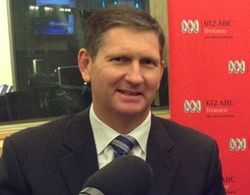
End in sight for Queensland doctor fight #qldpol #smoqld #keepourdoctors
ELEANOR HALL: To Queensland now, and after a long and very public stoush with doctors there over changes to their contracts, the State Government has made some concessions that could end the dispute.
Doctors have been arguing the new conditions will affect patient care. Now they say they’re cautiously optimistic.
In Brisbane, Stephanie Smail reports.
STEPHANIE SMAIL: Anger has been building among Queensland’s medical community over the new contracts. Over the past few months hundreds of doctors have packed meetings in Brisbane, waving placards saying “won’t sign”, and voicing their concerns about the impacts the new conditions could have on their patients.
The Australian Salaried Medical Officers Federation has been advising doctors not to accept the contracts and warning there could be mass resignations if doctors are forced to sign.
Queensland’s Health Minister Lawrence Springborg says he’s heard their concerns, and made concessions.
LAWRENCE SPRINGBORG: I think it’s addressed about all of those issues around transfer, around rostering, unfair the issue of dismissals, KPIs. And what I’ve actually indicated after discussion with some more doctors as well, at the Royal Brisbane and Women’s Hospital – indeed, their clinical directors – is the Government will be more than happy to put those agreed addendum points into the contract, and that will actually I think address a lot of the residual concerns.
STEPHANIE SMAIL: He says it makes sense to move senior doctors onto individual contracts.
LAWRENCE SPRINGBORG: Most highly functioning services around the country, around the world actually have their people on contract which are performance-based. These are performance based contracts with very, very strong accountabilities and linkage to outcomes. Also, the Government’s policy is to move its most highly renumerated public servants onto individual contracts; it just so happens that our doctors are the first.
STEPHANIE SMAIL: Mr Springborg fielded questions from doctors on ABC local radio last night.
DOCTOR: When are the words going to be fixed in cement that everybody’s read and everybody understand what we’re talking about? It just seems to be like walking on top of an earthquake; the ground’s moving under our feet all the time.
LAWRENCE SPRINGBORG: There has been a significant number of people who have signed the contract, and they’ve also asked me what happens. If there are updates and corrections, well, anyone who has signed or anyone who’s about to sign will actually benefit exactly the same from that.
STEPHANIE SMAIL: Senior doctors say they’re expecting to see the fine print of the deal later today. They’ve got until the end of the month to decide whether or not to sign up, and they’ve been told there’s no room to shift that deadline.
But the head of the Queensland branch of the Australian Medical Association Dr Sean Rudd says the devil is in the detail.
How much of a back down is this from the Queensland Government?
SEAN RUDD: I don’t think we can word it as a back down; I think that all along we’ve tried to move forward with them, and all along we have been slowly but surely moving forward. And the great thing is that we’ve gone from a very unfair contract to what looks like, at this stage, to be a much more fair contract.
STEPHANIE SMAIL: The Queensland Government has also moved to address concerns that the director-general of Queensland Health had the power to change senior doctors’ conditions. Law changes were passed last week to address the issue.
Dr Rudd says progress has been made with the negotiations and he’s hopeful a resolution isn’t far away.
STEPHANIE SMAIL: What sort of situation was the Queensland health system facing if these negotiation hadn’t gone forward? There were threats of mass resignations, of doctors moving interstate. Has this changed that?
SEAN RUDD: Look, it’s not up to me to decide what individual doctors do. Certainly, mass resignation is not something that we, as the AMAQ would like to see happen, and it’s not something that’s going to be either good for our members or good for the health service. So we’re very happy that things have moved forward, and we’re in a situation where hopefully that will not have to happen.
ELEANOR HALL: That’s Dr Sean Rudd from the Australian Medical Association, ending Stephanie Smail’s report.
Source and Audio: ABC NEWS
